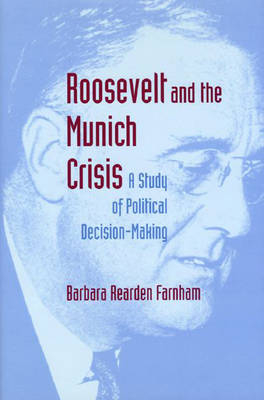
Roosevelt and the Munich Crisis
A Study of Political Decision-Making
Seiten
1997
Princeton University Press (Verlag)
978-0-691-02611-4 (ISBN)
Princeton University Press (Verlag)
978-0-691-02611-4 (ISBN)
- Titel ist leider vergriffen;
keine Neuauflage - Artikel merken
Roosevelt's intentions during the three years between Munich and Pearl Harbor have been a source of controversy among historians. This book offers both a theory of how the domestic political context affects foreign policy decisions in general and a re-interpretation of FDR's post-Munich policies.
Franklin Roosevelt's intentions during the three years between Munich and Pearl Harbor have been a source of controversy among historians for years. This book offers both a theory of how the domestic political context affects foreign policy decisions in general and a re-interpretation of FDR's post-Munich policies based on the insights that the theory provides. Between 1936 and 1938, Roosevelt searched for ways to influence the deteriorating international situation. When Hitler's behaviour during the Munich crisis showed him to be incorrigibly aggressive, Roosevelt settled on aiding the democracies, a course to which he adhered until America's entry into the war. This policy attracted him because it allowed him to deal with a serious problem: the conflict between the need to stop Hitler and the domestic imperative to avoid any risk of American involvement in a war. Since existing theoretical approaches to value conflict ignore the influence of political factors on decision-making they offer little help in explaining Roosevelt's behaviour.
As an alternative, this book develops a political approach to decision-making which focuses on the impact that awareness of the imperatives of the political context can have on decision-making processes and, through them, policy outcomes. It suggests that in the face of a clash of central values, decision-makers who are aware of the demands of the political context are likely to be reluctant to make trade-offs, seeking instead a solution that gives some measure of satisfaction to all the values implicated in the decision.
Franklin Roosevelt's intentions during the three years between Munich and Pearl Harbor have been a source of controversy among historians for years. This book offers both a theory of how the domestic political context affects foreign policy decisions in general and a re-interpretation of FDR's post-Munich policies based on the insights that the theory provides. Between 1936 and 1938, Roosevelt searched for ways to influence the deteriorating international situation. When Hitler's behaviour during the Munich crisis showed him to be incorrigibly aggressive, Roosevelt settled on aiding the democracies, a course to which he adhered until America's entry into the war. This policy attracted him because it allowed him to deal with a serious problem: the conflict between the need to stop Hitler and the domestic imperative to avoid any risk of American involvement in a war. Since existing theoretical approaches to value conflict ignore the influence of political factors on decision-making they offer little help in explaining Roosevelt's behaviour.
As an alternative, this book develops a political approach to decision-making which focuses on the impact that awareness of the imperatives of the political context can have on decision-making processes and, through them, policy outcomes. It suggests that in the face of a clash of central values, decision-makers who are aware of the demands of the political context are likely to be reluctant to make trade-offs, seeking instead a solution that gives some measure of satisfaction to all the values implicated in the decision.
Barbara Rearden Farnham is Senior Associate at the Institute of War and Peace Studies.
| Reihe/Serie | Princeton Studies in International History and Politics |
|---|---|
| Verlagsort | New Jersey |
| Sprache | englisch |
| Maße | 152 x 229 mm |
| Gewicht | 680 g |
| Themenwelt | Geschichte ► Allgemeine Geschichte ► 1918 bis 1945 |
| Geisteswissenschaften ► Geschichte ► Regional- / Ländergeschichte | |
| Geschichte ► Teilgebiete der Geschichte ► Militärgeschichte | |
| Sozialwissenschaften ► Politik / Verwaltung ► Staat / Verwaltung | |
| ISBN-10 | 0-691-02611-4 / 0691026114 |
| ISBN-13 | 978-0-691-02611-4 / 9780691026114 |
| Zustand | Neuware |
| Haben Sie eine Frage zum Produkt? |
Mehr entdecken
aus dem Bereich
aus dem Bereich
ein Psychologe erlebt das Konzentrationslager
Buch | Hardcover (2024)
Kösel (Verlag)
CHF 30,80
Mythos „Stauffenberg-Attentat“ – wie der 20. Juli 1944 verklärt und …
Buch | Hardcover (2024)
Goldmann (Verlag)
CHF 33,55
die letzte Woche des Dritten Reiches
Buch | Softcover (2023)
C.H.Beck (Verlag)
CHF 22,40


